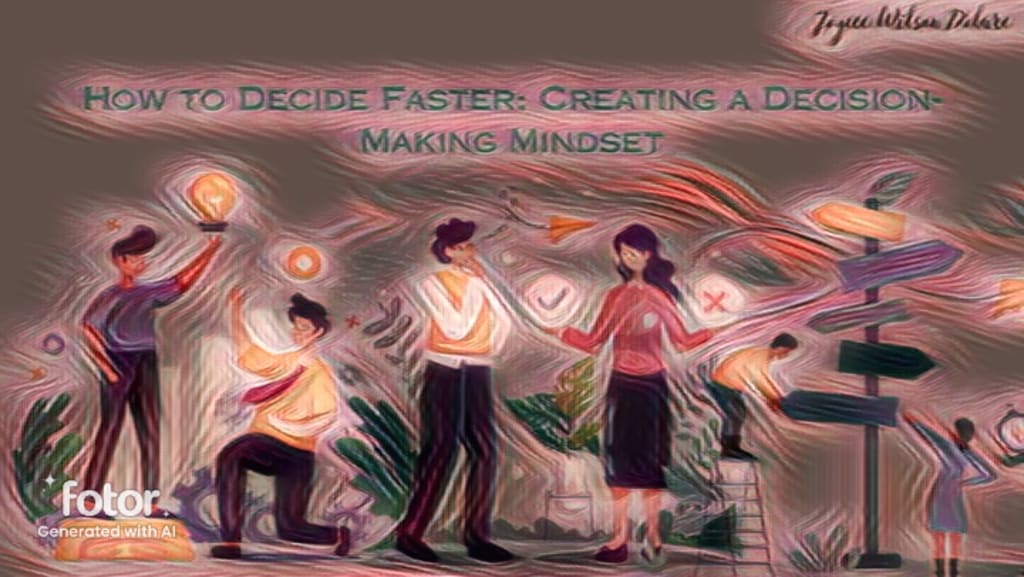how to decide faster
"Mastering Quick Decisions: Strategies for Efficient and Effective Decision-Making"

**How to Decide Faster: A Guide to Swift and Effective Decision-Making**
In today’s fast-paced world, the ability to make decisions quickly and effectively is a critical skill. Whether in business, personal life, or even everyday tasks, the speed and accuracy of your decisions can significantly impact your success and well-being. Here’s a comprehensive guide on how to decide faster without compromising on the quality of your decisions.
### 1. Understand the Decision's Importance
Before jumping into the decision-making process, evaluate the importance of the decision. Not all decisions require the same level of scrutiny. Categorize your decisions into three types:
- **Minor decisions**: These have little long-term impact and can often be made quickly.
- **Moderate decisions**: These require some thought and consideration but are not life-altering.
- **Major decisions**: These have significant consequences and require thorough analysis.
Understanding the weight of the decision helps allocate appropriate time and resources.
### 2. Set Clear Objectives
Define what you want to achieve with your decision. Clear objectives provide a direction and criteria for evaluating options. Ask yourself:
- What is the desired outcome?
- What are the must-have requirements?
- What are the nice-to-have features?
Having clear objectives narrows down your choices and speeds up the decision-making process.
### 3. Gather Necessary Information Quickly
Information is crucial, but too much information can paralyze you. Focus on gathering just enough information to make an informed decision. Use these strategies:
- **Set a time limit**: Allocate a specific amount of time for research to prevent overanalyzing.
- **Prioritize sources**: Use the most reliable and relevant sources first.
- **Seek expert advice**: If possible, consult someone with experience to gain insights quickly.
### 4. Limit Your Options
Too many choices can lead to decision fatigue. To decide faster, narrow down your options to a manageable number. Here’s how:
- **Eliminate less viable options early**: Quickly discard choices that don’t meet your essential criteria.
- **Use a decision matrix**: Compare options against your objectives and requirements to see which ones stand out.
### 5. Trust Your Intuition
Your intuition is a powerful tool built on past experiences and knowledge. Sometimes, your gut feeling can guide you effectively when time is short. While it shouldn’t replace logical analysis, it can be a valuable component in making quick decisions.
### 6. Make a Pros and Cons List
For more complex decisions, a pros and cons list can provide clarity. Write down the advantages and disadvantages of each option. This visual aid helps you see the trade-offs more clearly and facilitates a quicker decision.
### 7. Embrace the 80/20 Rule
The Pareto Principle, or 80/20 rule, suggests that 80% of outcomes result from 20% of efforts. Focus on the key factors that will drive the majority of the results. This approach prevents you from getting bogged down in details that have minimal impact.
### 8. Use Decision-Making Frameworks
Several frameworks can help structure your decision-making process:
- **SWOT Analysis**: Evaluates strengths, weaknesses, opportunities, and threats.
- **Decision Trees**: Maps out possible outcomes and their probabilities.
- **Cost-Benefit Analysis**: Weighs the costs and benefits of each option.
These frameworks provide a systematic approach to making decisions quickly.
### 9. Delegate When Appropriate
Recognize when you can delegate decisions. Trusting team members or colleagues with less critical decisions frees up your time for more important ones. Effective delegation involves clear communication of expectations and criteria.
### 10. Commit and Follow Through
Once you’ve made a decision, commit to it and move forward. Doubt and second-guessing waste time and can undermine your confidence. Trust in your process and the information you gathered.
### Conclusion
Deciding faster doesn’t mean being reckless. It’s about streamlining your decision-making process to be both efficient and effective. By understanding the importance of the decision, setting clear objectives, gathering necessary information quickly, limiting options, trusting your intuition, using decision-making frameworks, and committing to your choices, you can make swift decisions that propel you forward. Remember, practice makes perfect. The more you refine your decision-making skills, the faster and better you will become at making decisions.
**Understanding the Decision's Importance: The Key to Effective Decision-Making**
Every day, we make countless decisions. Some are so trivial that we hardly notice them, while others can have profound impacts on our lives. The ability to recognize and understand the importance of a decision is a crucial skill that can help us navigate our personal and professional lives more effectively. This blog post will explore why understanding the importance of a decision matters and provide practical tips on how to evaluate the significance of your choices.
### Why Understanding Decision Importance Matters
1. **Resource Allocation**
- Time, energy, and focus are limited resources. By understanding the importance of a decision, you can allocate these resources more efficiently. Minor decisions might only need a few moments of consideration, while major ones deserve thorough analysis and planning.
2. **Reducing Stress and Anxiety**
- Not every decision requires intense scrutiny. Distinguishing between minor and major decisions helps reduce unnecessary stress and anxiety. Knowing that you don't need to spend hours deliberating over what to have for lunch can free up mental space for more significant matters.
3. **Improving Outcomes**
- Understanding the gravity of a decision allows you to approach it with the appropriate level of seriousness. This ensures that critical decisions are made with the care and attention they deserve, leading to better outcomes in the long run.
4. **Enhancing Decision-Making Efficiency**
- By categorizing decisions based on their importance, you can streamline your decision-making process. This helps in making quicker decisions for less important matters, leaving more time for those that truly matter.
### How to Evaluate the Importance of a Decision
1. **Assess the Impact**
- Consider the potential consequences of the decision. Ask yourself:
- How will this decision affect my life or work?
- What are the short-term and long-term impacts?
- Who else will be affected by this decision?
2. **Determine the Reversibility**
- Some decisions are reversible; others are not. Understanding whether a decision can be easily undone can help gauge its importance. Irreversible decisions often require more careful consideration.
3. **Evaluate the Urgency**
- Urgency plays a crucial role in determining the importance of a decision. Some decisions need to be made quickly due to time constraints, while others can be deliberated over a longer period. Prioritize decisions that are both important and urgent.
4. **Consider the Information Available**
- The availability of information can influence the importance of a decision. If a decision requires a lot of unknowns or if the stakes are high, it becomes more important to gather and analyze relevant information before proceeding.
5. **Reflect on Your Values and Goals**
- Aligning decisions with your personal or organizational values and long-term goals is essential. Decisions that significantly impact your core values or major objectives should be treated with higher importance.
### Practical Tips for Decision-Making Based on Importance
1. **Create a Decision Matrix**
- A decision matrix helps in evaluating and prioritizing multiple decisions. List your decisions, rate them based on factors like impact, urgency, and reversibility, and then rank them accordingly. This visual tool can provide clarity on which decisions require more attention.
2. **Use the Eisenhower Box**
- The Eisenhower Box, or Urgent-Important Matrix, categorizes tasks into four quadrants:
- Urgent and important
- Important but not urgent
- Urgent but not important
- Neither urgent nor important
- This helps in prioritizing tasks and making better use of your time.
3. **Delegate When Appropriate**
- Not every decision needs to be made by you. Delegate less important decisions to others, allowing you to focus on more critical matters. Ensure that those to whom you delegate have the necessary information and authority to make the decisions effectively.
4. **Set Decision-Making Criteria**
- Establish criteria for different types of decisions. For instance, you might decide that financial decisions over a certain amount require a detailed analysis and consultation with a financial advisor. Having set criteria can streamline the process and ensure consistency.
5. **Practice Reflective Thinking**
- After making a decision, reflect on the process and the outcome. Consider what you did well and what could be improved. This reflective practice helps in refining your decision-making skills and better understanding the importance of future decisions.
### Conclusion
Understanding the importance of a decision is a foundational aspect of effective decision-making. By assessing the impact, reversibility, urgency, available information, and alignment with your values and goals, you can make more informed choices. Practical tools like decision matrices and the Eisenhower Box can aid in prioritizing and streamlining the decision-making process. Remember, the ability to discern the importance of a decision not only enhances your efficiency but also leads to better outcomes and a more focused approach to both personal and professional challenges.
About the Creator
peter
Content about cars, motorbikes, technology, news
Enjoyed the story? Support the Creator.
Subscribe for free to receive all their stories in your feed. You could also pledge your support or give them a one-off tip, letting them know you appreciate their work.






Comments
There are no comments for this story
Be the first to respond and start the conversation.